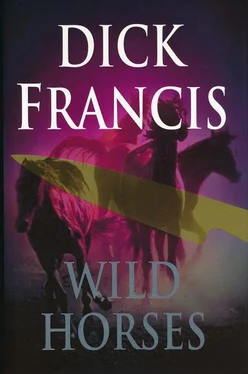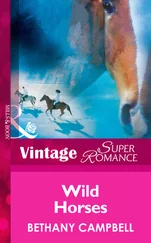‘Jeeze,’ Moncrieff murmured, looking through his lens.
I said, ‘Can you put a glint on those earrings?’
‘You don’t ask much!’
He positioned an inkie — an inkie-dinkie, meaning a very small spotlight — to give a glitter below her ears.
‘Great,’ I said. ‘Everyone ready? We’ll do a rehearsal. Yvonne, don’t forget you’re being followed by an earthy man who is parsecs away from a dream lover. You are already laughing at him in your mind, though not openly, as he has power to make Nash’s life — that’s to say, your film husband’s life — very difficult. Just imagine you’re being followed by a man you sexually despise but can’t be rude to... ’
Yvonne giggled. ‘Who needs to act? I meet them every day.’
‘I’ll bet you do,’ Moncrieff said under his breath.
‘Right then,’ I said, trying not to laugh, ‘we’ll do a walkthrough. Ready? And... ’ a pause, ‘go.’
Yvonne got it dead right at the second rehearsal and then we shot the scene for real twice, both times fit to print.
‘You’re a doll,’ I told her. She liked it, where Silva might have said ‘sexism’ or ‘harassment’. I liked women, all sorts; I’d simply discovered, as I had with male actors, that it saved time to accept, not fight, their views of themselves in the world.
In the scene Yvonne, talking to a man out of shot, had been saying she’d promised to prepare the loose box for a soon-to-arrive horse, a job she’d forgotten earlier but was now doing before joining her husband at a drinks party, to be held somewhere on his way home from the races.
So silly about her white sandals, she said, on the rough flooring. Would he please help her move the stack of hay bales, since — eyelashes fluttering — he was so much bigger and stronger than little Yvonne?
‘I’d lie down and die for her,’ Moncrieff observed.
‘He more or less did.’
‘Such a cynic,’ Moncrieff told me, moving lights to a point high among the rafters.
I rehearsed Yvonne through the scene where she realised the man meant business against her wishes. We trekked through surprise, discomfort, revulsion and, dangerously, mockery. I made sure she understood — and could personally relate to — every step.
‘Most directors just yell at me,’ she said at one point, when she’d fluffed her lines in rehearsal for the fifth or sixth time.
‘You look stunning,’ I said. ‘All you need to do is act stunned . Then laugh at him. Some men can’t bear women laughing at them. He’s full of lust for you, and you think he’s funny . What you’re doing is mocking him to madness. He’s going to kill you.’
Total comprehension lit her sweet features. ‘Get out the strait-jacket,’ she said.
‘Yvonne, I love you.’
We took a long series of shots of her face, one emotion at a time, and many of negative messages of body language and of the growth of fright, of panic, of desperate disbelief: enough to cut together the ultimate terror of approaching unexpected death.
We gave Yvonne a rest for lunch, while Moncrieff and I filmed the crews slapping heavy ropes sharply over the rafters, and tying frightful knots, to show the violence, the speed, the tack of mercy that I wanted. Naturally each segment took many minutes to stage and get right, but later, in cinemas, with every successful impression strung together — slap, slap, slap — the horror of the hanging would strike the popcorn crunchers silent.
I sat beside Yvonne on a hay bale. I said, ‘This afternoon we are going to tie your wrists together with that thick rope now hanging free from that rafter.’
She took it easily.
‘The man has by now frightened you so much that you are almost relieved that it is your wrists he has tied.’
She nodded.
‘But suddenly he pulls some slack into the rope leading from the rafter, and he loops the slack round your neck, and does it a second time, and pulls the rope tight until your pearls break and slide down inside your dress, and he leans all his weight on the free end of rope swinging from the rafter, and... er... he lifts you off your feet... and hangs you.’
Big-eyed, she said, ‘What do I say? Do I beg? It doesn’t say this.’
‘You don’t say anything,’ I said. ‘You scream.’
‘ Scream? ’
‘Yes. Can you?’
She opened her mouth and screamed up a hair-raising scale, alarming everyone on set and bringing them galloping to her rescue.
She giggled.
‘No one rescued Yvonne,’ I said regretfully, ‘but no one will forget that scream.’
We filmed a brutal hanging, but short of the dreaded ‘NC-17’ or ‘18’ certificates. We showed no black asphyxiated face, no terrible bloating. I got Yvonne to wriggle frantically while we suspended her from the wrists, but I filmed her only from the roped neck to her feet that frantically stretched down to the out-of-reach floor. We arranged for one of her white shoes to fall off. We turned the camera onto the shoe while the shadow of her last paroxysms fell across the white-washed walls, and we filmed her broken pearls and one twisted earring in the straw with her bare jerking toes just above.
That done, I let her down and hugged her gratefully; and told her she was marvellous, ravishing, brilliant, moving, could play Ophelia in her sleep and would undoubtedly appear on the Today Show (which fortunately, later, she did).
I’d planned from the beginning to shoot the hanging separate from the murderer just in case we needed to make a radical plot re-think at a later stage. By filming murder and murderer apart, one could slot in anyone’s face behind the rope. That afternoon, however, I’d invited Cibber to learn the murderer’s few lines, and he arrived on set with them only vaguely in his mind, while he expansively smoked a large cigar and exercised his fruity larynx on inappropriate jokes.
He patted Yvonne’s bottom. Silly old buffoon, I thought, and set about turning him into a lecherous bull.
I positioned him in the manger section, and gave him an ashtray to prevent his setting fire to the straw. We placed Yvonne so that her white dress, on the edge of the frame and out of focus from being too near the camera, nonetheless established her presence.
Moncrieff, concentrating on the lighting, added a sheet of blue gelatine across one of the spots. He looked through the lens and smiled, and I looked also, and there it was, the actor blinking, bored, waiting for us while we fiddled, but with the probability of his guilt revealed by a trick of light.
Cibber, as first written by Howard, had been a pillar of the Jockey Club, an upright, unfortunate victim of events. Reluctantly Howard, bowing to the film company, had agreed to write a (mild!) liaison between Cibber’s wife (Silva) and Nash Rourke. Equally reluctantly he had agreed that Cibber should persecute Nash for supposedly having hanged his (Nash’s) wife Yvonne. Howard still didn’t know that it would be Cibber himself that did the hanging. I would have trouble with Howard. Nothing new.
To me, the character of Cibber lay at the centre of the film’s dynamic. The Cibber I saw was a man constrained by his position in society; a man forced by upbringing, by wealth, by the expectations of his peers to mould himself into a righteous puritan, difficult to love, incapable of loving. Cibber couldn’t in consequence stand ridicule; couldn’t bear to know his wife had rejected him for a lover, couldn’t have waiters hearing his wife mock him. Cibber expected people to do his bidding. He was, above all, accustomed to deference.
Yet Cibber, underneath, was a raw and passionate man. Cibber hanged Yvonne in a burst of uncontrollable rage when she laughed at his attempt at rape. Appalled, unable to face his own guilt, Cibber persecuted Nash to the point of paranoia and beyond. Cibber, eventually, would be totally destroyed and mentally wrecked when Nash, after many tries, found that the one way to defeat his persecutor was to trap him into earning pitying sneers. Cibber would, at the end, disintegrate into catatonic schizophrenia.
Читать дальше












